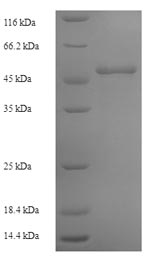This premium Recombinant Human OTC protein is a vital component for research in metabolism. Ornithine transcarbamylase, a mitochondrial enzyme, plays a critical role in the urea cycle, essential for the detoxification of ammonia and amino acid metabolism. This full length of mature protein (33-354aa) is expressed in E.coli, providing a dependable tool for a wide range of applications in metabolism research.
Featuring an N-terminal 6xHis-SUMO tag, our Recombinant Human OTC protein enables efficient purification and detection processes. With a purity greater than 90% as determined by SDS-PAGE, you can have confidence in the superior quality of this protein to support your research endeavors. Available in both liquid and lyophilized powder forms, our Recombinant Human OTC protein is tailored to meet your specific experimental needs and propel your scientific discoveries forward.






